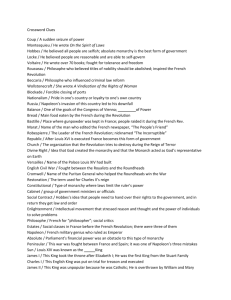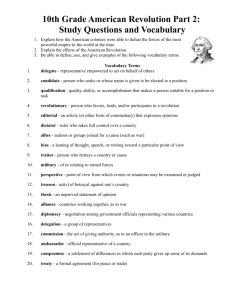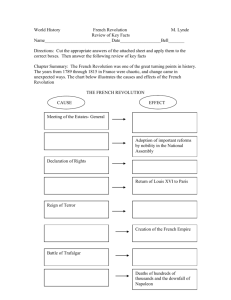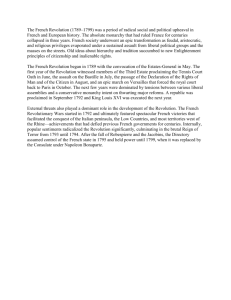History1122 Outline - Gordon State College
advertisement
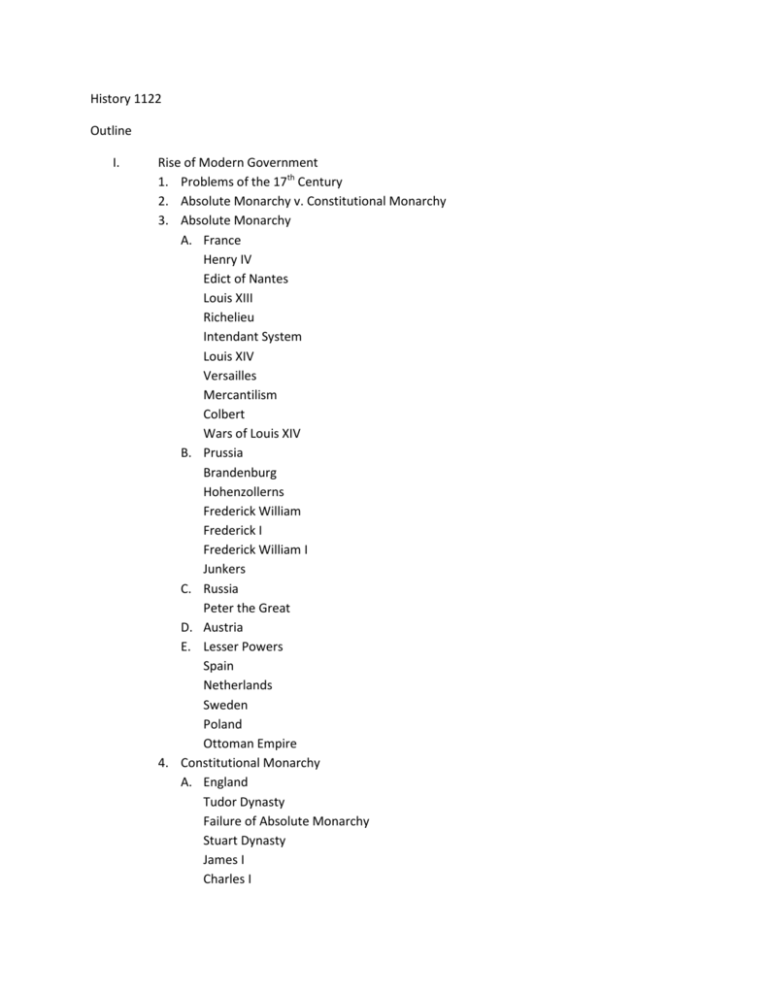
History 1122 Outline I. Rise of Modern Government 1. Problems of the 17th Century 2. Absolute Monarchy v. Constitutional Monarchy 3. Absolute Monarchy A. France Henry IV Edict of Nantes Louis XIII Richelieu Intendant System Louis XIV Versailles Mercantilism Colbert Wars of Louis XIV B. Prussia Brandenburg Hohenzollerns Frederick William Frederick I Frederick William I Junkers C. Russia Peter the Great D. Austria E. Lesser Powers Spain Netherlands Sweden Poland Ottoman Empire 4. Constitutional Monarchy A. England Tudor Dynasty Failure of Absolute Monarchy Stuart Dynasty James I Charles I II. III. IV. Long Parliament Civil War Cavaliers Roundheads Puritan Republic Restoration Glorious Revolution John Locke Scientific Revolution 1. Origins and Definition 2. Copernicus 3. Tyco Brahe 4. Johannes Kepler 5. Galileo 6. Isaac Newton 7. Results Enlightenment 1. Basic Trends of Thought 2. Philosophes Bernard de Fontenelle Encyclopedists Encyclopedia Physiocrats Laissez-faire Montesquieu Spirit of the Laws Voltaire Enlighten Absolutism Rousseau Social Contract 3. Results Deism Humanitarian Reform Great Expectations th 18 Century War 1. Causes of Constant War 2. War of the Austrian Succession War of Jenkins’ Ear Pragmatic Sanction Frederick the Great 3. Diplomatic Revolution 4. Seven Years War V. VI. VII. Coming of the French Revolution 1. Causes Monarchy Old Regime Financial System Enlightenment American Revolution 2. Crisis of 1789 Estates General National Assembly Oath of the Tennis Court French Revolution 1. Moderate Stage (1789-91) Bastille Great fear August Decrees Declaration of the Rights of Man and Citizen Constitution of 1791 Patriots Civil Constitution of the Clergy Foreign Policy Problems Pillnitz Jacobins Girondins 2. Radical Stage (1792-94) National Convention Mountain Sans-culottes Committee of Public Safety Robespierre Levee en masse 3. Thermidorian Reaction (1794-99) Constitution of the Year III Directory 4. Results of Revolution Napoleon Bonaparte 1. Government 2. Foreign Affairs 3. Domestic reform 4. Grand Empire 5. Continental System 6. Defeat of Napoleon VIII. IX. X. Industrial Revolution 1. Necessary Conditions 2. Industrialization in Britain 3. Results of Industrialization 4. Industrialization: Good or Bad? Europe After Napoleon 1. Defeat of Napoleon Treaty of Chaumont 1st Treaty of Paris 2. Congress of Vienna Representatives and Aims Principles Balance of Power Legitimacy Compensation Settlement 3. Quadruple Alliance 4. Holy Alliance Liberalism, Nationalism, Conservatism 1. Definitions Liberalism Classical Economists Nationalism French revolution Romanticism Conservatism 2. Revolution and Reaction France Charles X Four Ordinances July Monarchy Louis Philippe Belgium 3. Revolutions of 1848 France Bloody June Days 2nd Republic Germany Frankfurt Assembly Humiliation of Olmutz Austria Ausgleich XI. XII. XIII. Nationalism: Post 1848 1. France 2nd Republic Louis Napoleon Bonaparte 2nd Empire Authoritarian Empire Liberal Empire 2. Italy Mazzini Cavour Kingdom of Italy 3. Germany Otto von Bismarck Austro-Prussian War Franco-Prussian War German Empire 4. Austria 5. Russia Democracy 1. Definition 2. Identification with Nationalism 3. Necessary Conditions 4. Great Britain 5. France Paris Commune 3rd Republic Dreyfus Affair 6. Italy 7. Germany 8. Russia Populists Social Revolutionaries Social Democrats Bolsheviks Mensheviks Cadets October Manifesto Duma 9. Results of Democracy Science and Society 1. 19th Century Science 2. Challenges XIV. XV. Darwin Freud Physicists Planck Einstein Heisenberg 3. Philosophy Spencer Nietzsche Karl Marx 4. Religion 5. Public Mind 6. Imperialism Origins of WWI 1. Long Range Causes International Anarchy Nationalism Imperialism German Empire Alliance System Mobilization Plans 2. Short Range Causes 1st Balkan Crisis 2nd Balkan Crisis 3rd Balkan Crisis Black Hand Blank Check 3. Guns of August WWI 1. West (1914) Schlieffen Plan Plan XVII Battle of the Marne 2. East (1914) Tannenberg Masurian Lake 3. East (1915) 4. West (1915) Ypres 5. West (1916) Verdun Somme XVI. 6. 3rd Fronts Lusitania Secret treaty of London Gallipoli 7. West (1917) 8. East (1917) 9. 1918 10. Home Front Political Centralization Economic Centralization Thought Control and Propaganda 11. Results of War Treaty of Versailles Organization of the Peace Conference 1. 2. 3. 4. Council of Four Territorial Settlement Disarmament Reparations Article 231 5. Eastern Settlement Sanitary Corridor 6. League of Nations XVII. Russian Revolution 1. Pre-war Russia Economics Society Politics Rasputin 2. March revolution Soviet of Workers Duma 3. Vladimir Lenin 4. November Revolution 5. Civil War Red Army Leon Trotsky Cheka Red Terror 6. Union of Soviet Socialist Republics XVIII. Soviet Union to 1940 1. XIX. XX. XXI. 1. New Economic Policy 2. Stalin v Trotsky 3. Socialism in One Country 4. Five Year Plans 5. Results Triumph of Democracy 1. Great Britain Economic Weakness Imperial Problems Ineffective Government Great Depression 2. France War Damage Economic Recovery Great Depression Political Instability Leon Blum and the Popular Front Rise of Fascism 1. Italy 2. WWI 3. Mussolini 4. Avanti 5. Fascist Party 6. Black Shirts 7. March on Rome 8. Acerbo Election bill 9. Fascism Germany and the Rise of Hitler 1. Postwar Germany Spartacists Frei-Korps 2. Weimar Republic 3. Adolf Hitler Nazi party Beer Hall Putsch Mein Kampf 4. Stresemann 5. Nazi Takeover Enabling Act Night of the Long knives Nuremberg Laws XXII. XXIII. XXIV. Causes of WWII 1. WWI and the Treaty of Versailles 2. Failure of the League of Nations Manchuria Ethiopia 3. Appeasement Rhineland Spanish Civil War Anschluss Sudetenland Poland WWII 1. Western Front (1940-41) Maginot Line Ardennes Forest Dunkirk Operation Sea Lion 2. Africa (40-41) 3. Russia (40-41) 4. United States (40-42) Pearl Harbor Coral Sea Midway 5. Strategic Bombing 6. Africa (42-43) 7. Russia (42-43) Stalingrad Teheran Conference 8. Europe (44-45) Operation Overlord Holocaust Battle of the Bulge 9. Pacific (43-45) Manhattan Project Hiroshima Peace and Cold War 1. Atlantic Charter 2. Teheran Conference 3. Yalta Conference 4. Potsdam Conference 5. Cold War Berlin Blockade Truman Doctrine Marshall Plan Containment 6. 2nd Half of the 20th Century Western Europe Eastern Europe Soviet Union and the End of the Cold War 7. The Uncertain Future
